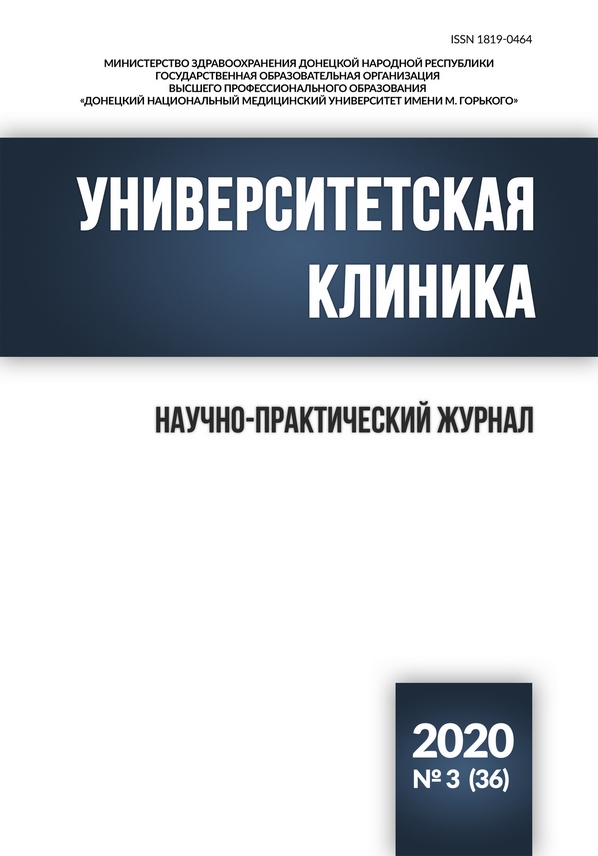ЭФФЕКТИВНОСТЬ ИСПОЛЬЗОВАНИЯ B. INFANTIS 35624 В ЛЕЧЕНИИ СИНДРОМА РАЗДРАЖЕННОГО КИШЕЧНИКА
Аннотация
Одним из наиболее распространенных в популяции функциональных гастроинтестинальных расстройств является синдром раздраженного кишечника. За последние годы возрос интерес к возможной роли микробиоты кишечника в патогенезе функциональных гастроинтестинальных расстройств. Использование пробиотиков является перспективным методом лечения пациентов с данной патологией. В статье представлены современные литературные данные об эффективности применения пробиотика Bifidobacterium infantis 35624 в купировании основных клинических проявлений синдрома раздраженного кишечника, в результате противовоспалительного и иммуномодулирующего свойств пробиотика.
Литература
2. Налетов А.В., Вьюниченко Ю.С., Коктышев И.В. Оценка качества жизни детей с синдромом раздраженного кишечника, проживающих в условиях военного конфликта в Донбассе. Университетская клиника. 2018; 2(27): 12-16.
3. Hyams J. S., Di Lorenzo C., Saps M., et al. Functional disorders: children and adolescents. Gastroenterology. 2016; 150: 1456-1468e2.
4. Drossman D.A., Hasler W.L. Rome IV – Functional GI disorders: disorders of Gut-Brain interaction. Gastroenterology. 2016; 150(6): 1262-79.
5. Lacy B.E., Mearin F., Chang L., et al. Bowel Disorders. Gastroenterology. 2016; 150: 1393-1407.
6. Налетов А.В., Вьюниченко Ю.С., Лянник В.А. Особенности течения синдрома раздраженного кишечника у детей, проживающих в условиях военного конфликта в Донбассе. Университетская клиника. 2018; 1 (26): 54-58.
7. Трухан Д.И., Голошубина В.В., Иванова Д.С. Актуальные вопросы диагностики и лечения синдрома раздраженного кишечника. Медицинский совет. 2018; 21: 110-116.
8. Gerritsen J., Smidt H., Rijkers G.T., de Vos W.M. Intestinal microbiota in human health and disease: the impact of probiotics. Genes Nutr. 2011; 6: 209-240.
9. Distrutti E., Monaldi L., Ricci P., Fiorucci S. et al. Gut microbiota role in irritable bowel syndrome: New therapeutic strategies. World J. Gastroenterol. 2016. 22 (7): 2219-2241.
10. Bull M.J., Plummer N.T. Part2: Treatment for chronic gastrointestinal disease and gut dysbiosis. Integr. Med (Encinitas). 2015; 14 (1): 25-33.
11. Charbonneau D., Gibb R.D., Quigley E.M. Fecal excretion of Bifidobacterium infantis 35624 and changes in fecal microbiota after eight weeks of oral supplementation with encapsulated probiotic. Gut Microbes. 2013; 4 (3): 201-211.
12. McCarthy J., O’Mahony L., O’Callaghan L., et al. Double blind, placebo controlled trial of two probiotic strains in interleukin 10 knockout mice and mechanistic link with cytokine balance. Gut. 2003; 52: 975-980.
13. Jobin C., Sartor R. B. The I kappa B/NF-kappa B system: a key determinant of mucosal inflammation and protection. Am. J. Physiol. Cell Physiol. 2000; 278: C451-C462.
14. O`Mahony L., O'Callaghan L., McCarthy J., et al. Differential cytokine response from dendritic cells to commensal and pathogenic bacteria in different lymphoid compartments in humans. Am. J. Physiol. Gastrointest. Liver Physiol. 2006; 290 (4): G 839-845.
15. Konieczna P., Groeger D., Ziegler M., et al. Bifidobacterium infantis 35624 administration induces Foxp3 T regulatory cells in human peripheral blood: potential role for myeloid and plasmacytoid dendritic cells. Gut. 2012; 61 (3): 354-366.
16. O’Mahony L., McCarthy J., Kelly P., et al. Lactobacillus and Bifidobacterium in irritable bowel syndrome: symptom responses and relationship to cytokine profiles. Gastroenterology. 2005; 128: 541-551.
17. McFarland L.V., Dublin S. Meta-analysis of probiotics for the treatment of irritable bowel syndrome. World J. Gastroenterol. 2008; 17: 2650-2661.
18. Whorwell P.J., Altringer L., Morel J., et al. Efficacy of an encapsulated probiotic Bifidobacterium infantis 35624 in women with irritable bowel syndrome. Am. J. Gastroenterol. 2006; 101 (7): 1581-1590.
19. Aragon G., Graham D.B., Borum M., Doman D.B. Probiotic therapy for irritable bowel syndrome. Gastroenterol. Hepatol. (NY). 2010; 6 (1): 39-44.
20. Johnson A.C., Greenwood-Van Meerveld B., McRorie J. Effects of Bifidobacterium infantis 35624 on post-inflammatory visceral hypersensitivity in the rat. Dig. Dis. Sci. 2011; 56 (11): 3179-3186.
21. McKernan D.P., Fitzgerald P., Dinan T.G., Cryan J.F. The probiotic Bifidobacterium infantis 35624 displays visceral antinociceptive effects in the rat. Neurogastroenterol. Motil. 2010; 22 (9): 1029-1035.
22. Groeger D., O’Mahony L., Murphy E.F., et al. Bifidobacterium infantis 35624 modulates host inflammatory processes beyond the gut. Gut Microbes. 2013; 4 (4): 325-339.
23. Altmann F., Kosma P., O’Callaghan A., et al. Genome analysis and characterisation of the exopolysaccharide produced by Bifidobacterium longum subsp. longum 35624™. PLoS One. 2016; 11(9): e0162983.
24. Schiavi E., Plattner S, Rodriguez-Perez N, et al. Exopolysaccharide from Bifidobacterium longum subsp. longum 35624 modulates murine allergic airway responses. Benef Microbes. 2018; 9 (5): 761-773.
25. Ringel-Kulka T., McRorie J, Ringel Y. Multi-center, double-blind, randomized, placebo-controlled, parallel-group study to evaluate the benefit of the probiotic Bifidobacterium infantis 35624 in non-patients with symptoms of abdominal discomfort and bloating. Am. J. Gastroenterol. 2017; 112 (1): 145-151.
26. Yuan F., Ni H., Asche C.V., et al. Efficacy of Bifidobacterium infantis 35624 in patients with irritable bowel syndrome: a meta-analysis. Curr. Med. Res. Opin. 2017; 33 (7): 1191-1197.




